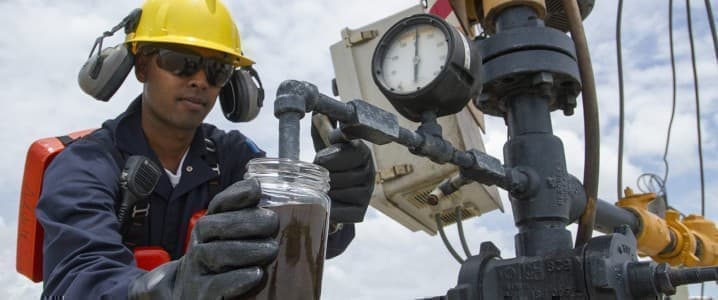A series of setbacks emerged during 2022 which derailed deeply impoverished Suriname’s nascent oil boom. The former Dutch colony of around 600,000 people, which shares the Guyana Suriname Basin with nearby Guyana, is believed to possess significant offshore petroleum potential. It is estimated that 1.4-million-acre offshore Block 58 where 50% partners Apache and TotalEnergies, which is the operator, have made five commercial discoveries, contains as much as 6.5 billion barrels of oil. If proven correct and successfully exploited, this will endow Suriname with a massive economic boom on the scale of that being enjoyed by Guyana where the economy grew by a stunning 62% during 2022. For these reasons, a fiscally challenged government in Paramaribo, which is facing an economic crisis and the threats of yet another sovereign debt default, views Suriname’s offshore oil potential as an economic silver bullet.
It appears, however, that the former Dutch colony’s nascent oil boom is stalled. The final investment decision from Apache and TotalEnergies, which is the operator, regarding the billion-dollar development of Block 58 offshore Suriname was expected last year but has been delayed. TotalEnergies CEO Patrick Pouyanne explained during late-2022 that the energy supermajor was concerned by a lack of understanding of the reservoirs discovered and a mismatch between seismic data and drilling results. This has postponed the first oil from Block 58 to at least 2027, perhaps even later, when it had initially been expected by Paramaribo in two years. When it is considered that it will take an investment of somewhere between $6 billion and $10 billion to develop Block 58 and bring it to first oil TotalEnergies hesitance is understandable. Related: Europe's Largest Gas Producer Is Set To Nationalize Its Gas Pipelines
This constituted a serious blow for deeply embattled President Chandrikapersad Santokhi who is facing political and economic crises in a nation which is one of the poorest in South America. Suriname’s 2022 gross domestic product per capita of $5,710 the third lowest on the continent before Bolivia with Venezuela in last place. The former Dutch colony was hit particularly hard by the 2020 COVID-19 pandemic which exposed the economic weaknesses created by Dési Bouterse who was in power from 2010 to 2020. During 2020, Suriname’s gross domestic production shrank by 16% which was the worst performance in South America after Venezuela. Since then, the economy has failed to recover with 2021 GDP falling almost 3% and then only expanding by a mere 1.3% during 2022 when other South American countries were enjoying robust growth. More alarming is that the economic crisis sparked by the pandemic saw Suriname default three times on its sovereign debt and the country is facing the prospect of yet another default.
In an attempt to shore up Paramaribo’s shaky finances, President Santokhi secured a nearly $700 million financing program from the International Monetary Fund, which was awarded on the condition of the government implementing harsh economic reforms. Those included removing fuel and electricity subsidies as part of a homegrown economic plan to restore fiscal and economic stability. This has only worsened the plight of everyday people in the impoverished South American country where inflation spiraled to 58% during February 2023. The soaring cost of living sparked violent anti-government demonstrations during February 2023 with protestors storming Suriname’s parliament. These events are magnifying the crises facing President Santokhi’s administration and the urgency with which a solution must be found.
Paramaribo had expected an offshore oil boom to resolve Suriname’s economic woes, but there are signs that the FID for Block 58 is still some way off. Even after TotalEnergies demurred on making the FID during 2022 there were government expectations that it would be made during 2023, which could have seen first oil from Block 58 delivered by as early as 2027. It now appears that the FID will be made during 2024 (Dutch) at the earliest, but it could be delayed further if drilling results and flow testing do not meet expectations. The FID was delayed in part due to a series of non-commercial oil discoveries and dry wells. The latest poor drilling result was at the Awari well which was completed in November 2022 and deemed non-commercial, plugged and abandoned.
Since then, Apache announced the successful drilling and flow testing of the Sapakara South-2 appraisal well which found 118 feet of net oil pay in what was deemed to be a high quality reservoir. Flow test and pressure data indicates that there are more than 200 million barrels of oil in place adding substantial resources to any planned development. Those results according to Apache CEO John J. Christmann IV confirm the company’s pre-drill expectations as well as geologic, geophysical, and reservoir models. That comes on the back of the June 2022 announcement of successful flow testing of the Krabdagu Discovery Well and the Sapakara South-1 appraisal well during November 2021.
Appraisal work is continuing on Block 58. The Krabdagu-2 appraisal was being drilled at the time of Apache’s February press release and will be followed by the Krabdagu-3 well which was scheduled to be spudded during February 2023. If Apache and TotalEnergies continue to experience the success reported during February 2023 then it is foreseeable that the FID for Block 58 will be made next year. Nonetheless, with it likely to take at least three years and potentially longer, to bring the block to first oil this could very well be too late for President Santokhi with a debt crisis and further civil unrest looming. Time is running out for Suriname to successfully exploit the considerable oil potential which lies offshore as the push to decarbonize the world economy gains momentum. This is amplified by the strict fiscal terms of Suriname’s oil production agreements and the impoverished country’s political instability.
By Matthew Smith for Oilprice.com
More Top Reads From Oilprice.com:
- Top 10 Countries With Largest Oil Reserves
- Think Tank Says Coal Use In EU Dropped This Winter
- 3 Reasons Why Oil & Gas Is Goldman Sachs’ Favorite Sector


















